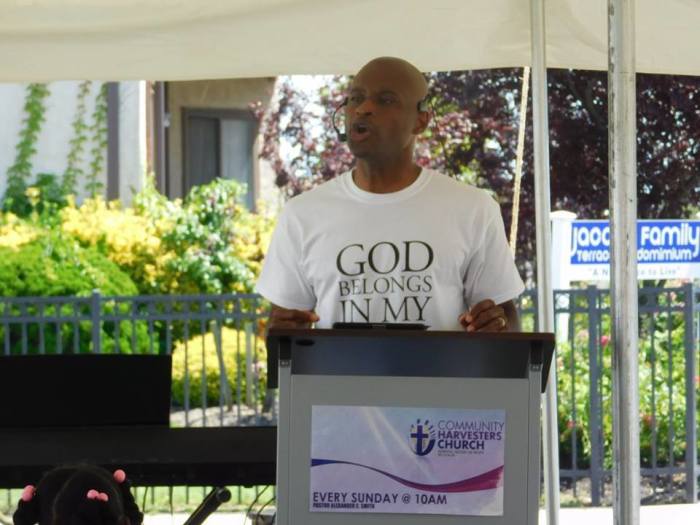NJ firefighter-pastor sues fire department for making him shave beard he grew for religious reasons

A born-again Christian firefighter and pastor in New Jersey has filed a federal civil rights lawsuit against Atlantic City as well as the fire department’s chief and deputy chief for threatening to suspend him without pay unless he shaved a beard he claims he grew for religious reasons.
In the lawsuit which was filed last week, according to NJ.com, the 15-year veteran firefighter Alexander Smith, who also leads the Community Harvesters Church in Atlantic City, is suing the city and his superiors, Chief Scott Evans and Deputy Chief Thomas Culleny Jr. for violating his religious freedoms under the First Amendment and for violating the New Jersey Civil Rights Act, NJ.com said.
He is also seeking an injunction to prevent any adverse employment actions against him as well as an award of compensatory and punitive damage.
Smith, who works as an air mask technician at an annual salary of $115,000, said he began growing out his beard last December as an expression of his faith.
He tried to get special accommodation for his 3-inch beard from the city on Jan. 3 since beards are prohibited by the fire department’s guidelines. The city, however, denied his request on Feb. 15, due to “overwhelming safety concerns” for Smith, as well as other firefighters, the lawsuit said. Facial hair can affect the seal of the breathing apparatus mask firefighters wear when they face fires, the report said.
Smith argued that as an air mask technician, when he responds to fires it is “solely for the purpose of refilling SCBA air bottles," according to the lawsuit.
“His job responsibilities do not include participation in extinguishing fires or search and rescue,” it adds.
Due to the denial of his religious accommodation he is now required to show up for work clean shaven. Smith’s attorney, Luna Droubi, has filed a request seeking a temporary restraining order against the shaving requirement until his lawsuit is resolved, allowing him to keep his beard for now.
Smith must prove he would face irreparable injuries and that his constitutional rights would be violated in order for a temporary restraining order to be granted.
The lawsuit states that the bylaws of Smith’s church say that growing a beard is a scriptural practice that is encouraged because “many of the prophets in the Bible wore beards.”
Photos from the Community Harvesters Church website as well as the church’s Facebook page do not show Smith, who turns 43 next month, with a beard. The married father of three who has been a born-again Pentecostal believer since age 10 appears to freely sport a clean-shaved head and face.
When contacted through his church by The Christian Post for comment Thursday, Smith did not immediately respond.
“Born and raised in Atlantic City as a Pentecostal believer, he developed a love and sense of compassion for others. Alexander was baptized in water and filled with the Holy Ghost at the age 10,” the church’s website says of Smith. “In the year of 2000 Pastor Smith accepted his calling and was ordained a minister under the leadership of Bishop John R. Gandy. In March 2009 we purchased a church building in Atlantic City and started The Way of Holiness Temple which was changed to Community Harvesters Church in 2013. Alexander was ordained pastor by The Universal Life Church in Modesto California, in 2011, and PA of W in 2017,” it adds.
The church’s website which was last updated on Aug. 31, 2018, further noted that Smith is pursuing a Masters of Divinity from Rockbridge Theological Seminary in Springfield, Missouri, and serves as “a Police and Firemens Chaplain for the city of Atlantic City.”
In 2015, the Supreme Court ruled that Arkansas must allow a Muslim prisoner to grow a beard that he says his religion requires.
In that opinion, Justice Samuel A. Alito Jr., said Arkansas prison officials had violated a federal law passed to protect religious practices from policies set by state and local officials.
While the Religious Land Use and Institutionalized Persons Act does not require a prison to grant religious exemptions simply because a prisoner asks or because other prisons do, Alito said Arkansas officials offered no evidence that a short beard posed security risks or could serve as a hiding place for contraband, as the officials once argued.
Smith’s lawsuit referenced a 1999 Third Court of Appeals opinion written by Alito that says a Newark police department policy to discipline two Islamic officers who refused to shave their beards was unconstitutional and violated the First Amendment.
Droubi also argued that the U.S. armed forces have “revised their grooming policies to provide for religious accommodations in these circumstances.”





























